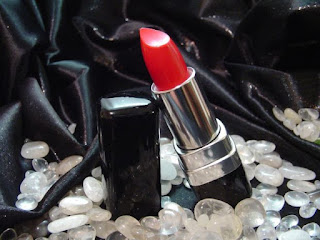- Although the word "lipstick" wasn't used until 1880, lipstick has a history going back much further than that. Cosmetic cases containing lip rouge have been found in Ancient Sumeria dating back to 3,500 B.C.
- In ancient Egypt, both men and women wore Lip colour. It was, at that time, an indication of their social status. Magenta, blue-black, and Orange were popular colours then, as well as red. Lipstick was also an indicator of social class in ancient Rome.
- In Greece, however, it wasn't done for high-class ladies to wear it. Wearing lipstick was the mark of a prostitute. There was even a law which said that prostitutes must wear lipstick at all times because to be seen in public without it meant they were "improperly posing as ladies."
- In England, one person who helped popularise lipstick was Queen Elizabeth I. She believed, as many did in those times, that lipstick had healing properties. When she fell ill, she'd put on lipstick. She was said to have had half an inch of lipstick on her lips when she died.
- People around that time thought lipstick had magical properties and was denounced by the church for that reason, and also because it was deemed sinful to alter the face god gave you. Using lipstick in some US states was grounds for divorce, because it meant the woman was tricking her suitor in to believing she was more attractive than she actually was.
- In ancient times, the ingredients of lipstick were at best disgusting and at worst, toxic. The disgusting ingredients included sheep sweat, human saliva, ox marrow, crushed insects and Crocodile excrement. White Lead, fucus and vermillion were among the toxic ingredients. In ancient Rome, poor people would use red Wine to stain their lips, so were less likely to suffer ill effects from their lip colour. The Mesopotamians used crushed jewels to create shimmery lip paints, but most cultures used fish scales to boost shine. In fact, fish scales are still used in some lipsticks today.
- In 1912, Elizabeth Arden handed out red lipstick to women marching in New York for the right to vote. Red lips became a badge of the Suffragette movement.
- In Victorian times, lipstick was considered vulgar, but women would form secret societies - "underground lip rouge societies" would meet in secret to trade recipes.
- While lipstick might not actually be magic, it does have effects on a woman's morale and her attractiveness to potential mates. According to a study conducted by the University of Manchester, men stare at women wearing Red lipstick for an average of 7.3 seconds, Pink lipstick for an average of 6.7 seconds, and women with bare lips for an average of 2.2 seconds. It's certainly a morale booster - there is an actual phenomenon known as "the lipstick effect" where it has been proved that in times of economic recession and even on rainy days, sales of lipstick go up. Winston Churchill knew this - lipstick was the only cosmetic kept in production during the second world war, because he believed it to be a morale booster.
- It's often said that a woman who wears lipstick every day will swallow about 4 pounds of the stuff during her lifetime. While lipstick wearers are inevitably going to swallow some, it's hard to know how much. 4 pounds is the equivalent of 533 tubes of lipstick, so it's highly unlikely to be that much.
Monday, 29 July 2019
29 July: National Lipstick Day
Today is National
Lipstick Day. Here are 10 things you never knew about lipstick.
Labels:
Fashion
Subscribe to:
Post Comments (Atom)

No comments:
Post a Comment